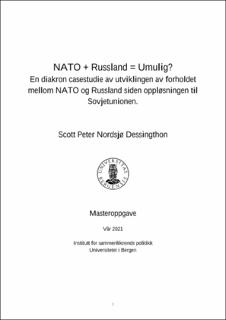| dc.contributor.author | Dessingthon, Scott Peter Nordsjø | |
| dc.date.accessioned | 2021-08-10T23:54:15Z | |
| dc.date.available | 2021-08-10T23:54:15Z | |
| dc.date.issued | 2021-07-02 | |
| dc.date.submitted | 2021-08-09T22:00:09Z | |
| dc.identifier.uri | https://hdl.handle.net/11250/2767238 | |
| dc.description.abstract | Fra 16. Oktober 1962 til 28. Oktober 1962 holdt verden pusten. Krisen handlet om utplasseringen av atomvåpenraketter på Cuba. Den daværende amerikanske presidenten John F. Kennedy iverksatte en skipsblokade rundt øyen, og uttalte at USA var villig til å anvende militærmakt for å nøytralisere trusselen. I 13 dager var det en politisk og militær «standoff» mellom USA og Sovjetunionen. I 13 dager holdt verden pusten og forberedte seg på atomkrig. Krisen endte meg at Sovjetunionen fjernet atomrakettene sine fra Cuba, i bytte mot at USA lovet å ikke invadere øyen, i tillegg til at USA fjernet atomrakettene sine i Tyrkia. Dette er det nærmeste verden har vært til atomkrig, før Cuba-krisen og siden. I de 30 årene som har gått siden Sovjetunionens oppløsning, har det vært flere forsøk på samarbeid mellom NATO og Russland. Hvert forsøk har deretter blitt avbrutt av perioder med konfrontasjoner og anklager, før man har prøvd igjen. Russland har siden slutten på den kalde krigen utfordret Vesten gjennom ulike handlinger i Europa og Midtøsten. Under andre verdenskrig var Vesten og Sovjetunionen samlet i kampen mot Nazi-Tyskland. Vestlige og sovjetiske styrker kjempet side om side, før de etter andre verdenskrig var bitre fiender i nærmere 45 år under den kalde krigen. En analyse av forholdet mellom NATO og Russland er på mange måter en analyse av forholdet verden har utviklet seg i etter andre verdenskrig. NATO representerer demokratiet og de vestlige verdiene, mens Sovjetunionen / Russland representerer det autoritære aspektet som motpol. Russland var etter Sovjetunionens oppløsning en svak internasjonal maktfaktor. Til tross for landets atomvåpen, så var ikke Russland lenger anerkjent som en internasjonal maktfaktor. Deres internasjonale og diplomatiske innflytelse over spesielt Europa, var svært svekket. Det er derfor dagsaktuelt å se på utviklingen av forholdet mellom NATO og Russland, ettersom Russland i dag igjen kan sies å regnes som en maktfaktor i det internasjonale samfunnet. Russland har i dag innflytelse i Midtøsten, dette skyldes landet sin innblanding i borgerkrigen i Syria og Libya. De har innflytelse i Europa, gjennom annekteringen av Krim, energiavtalen Nord Stream 2, og de prøver å få innflytelse i NATO, via en bilateral våpenavtale med Tyrkia, som er NATO medlem. | |
| dc.description.abstract | There is no doubt that the relationship between the North Atlantic Treaty Organization and The Russian Federation is at a low point long since seen. The Ukrainian crisis since 2014 was the culmination of a long series of incidents since the dissolution of the Soviet Union. However, there have been times since the dissolution that saw a motivational and aspiring relationship blooming between NATO and Russia, before different events and decisions made the relationship go sour. This thesis seeks to develop a comprehensive understanding of the development of the relationship between the North Atlantic Treaty Organization and the Russian Federation, since the dissolution of the Union of Soviet Socialist Republics, commonly referred to as the Soviet Union or the USSR. The thesis will analyze four different processes since the dissolution of the Soviet Union, where NATO and Russia have tried to establish a substantial relationship, and accordingly why these processes have failed. The NATO expansion eastwards in later stages of the 90’s and the early stages of the 2000’s, will be integral parts of the thesis analysis. The thesis applies a qualitative method with a case study as a research design. I am using existing literature from academic sources on the topic, and I will analyze the historic events since the dissolution of the Soviet Union through the method Process-tracing to try and see whether there is a pattern, and whether the four processes of cooperation would ever have a fighting chance of survival. I will look at which historic events and happenings have occurred, and how these events specifically have affected the development of the relationship. For better or for worse, could other decisions have been made to strengthen the relationship? My findings indicate that Russia has been more concerned with restoring her old international power status, rather than being actually concerned with NATOs geographical expansion. NATO, and especially the United States of America, on the other hand, have been specifically interested in retaining their control as the sole great power in Europe’s security decisions. There have been broken promises from both NATO and Russia, but the 21st century has seen Russia once more rise to the occasion as a great power, and it will be interesting so see how NATO meets this potential challenge. | |
| dc.language.iso | nob | |
| dc.publisher | The University of Bergen | |
| dc.rights | Copyright the Author. All rights reserved | |
| dc.subject | critical junctures | |
| dc.subject | Russland | |
| dc.subject | NATO | |
| dc.subject | prosess-sporing | |
| dc.subject | comparative historical analysis | |
| dc.subject | kvalitativ metode | |
| dc.subject | defence policy | |
| dc.subject | komparativ historisk analyse | |
| dc.subject | path-dependency | |
| dc.title | NATO + Russland = Umulig? | |
| dc.title.alternative | NATO + Russia = Impossible? | |
| dc.type | Master thesis | |
| dc.date.updated | 2021-08-09T22:00:09Z | |
| dc.rights.holder | Copyright the Author. All rights reserved | |
| dc.description.degree | Masteroppgave | |
| dc.description.localcode | SAMPOL350 | |
| dc.description.localcode | MASV-SAPO | |
| dc.subject.nus | 731114 | |
| fs.subjectcode | SAMPOL350 | |
| fs.unitcode | 15-13-0 | |
